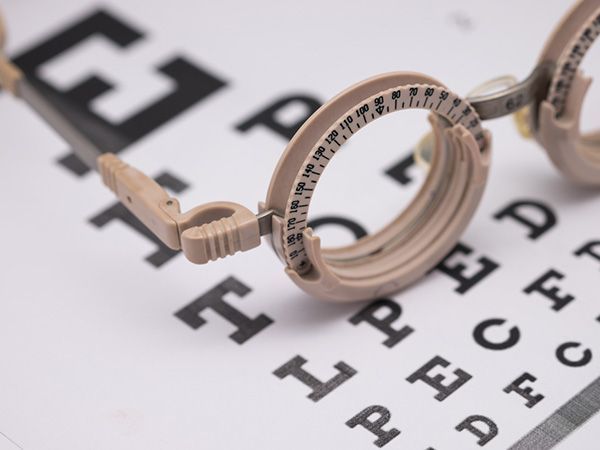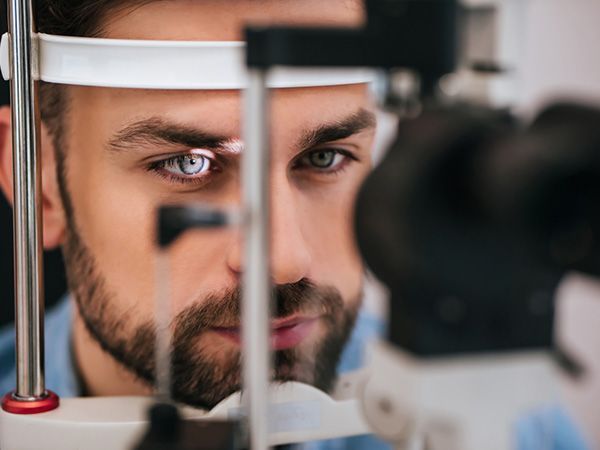Mountain Top Eye Care Pediatric Eye Exams: Expert Pediatric Eye Care for Infants, Children, and Teens
Eye Care for Every Stage: From Bright Beginnings to Bright Futures

At Mountain Top Eye Care, we understand your child’s vision is precious. That’s why we offer expert eye care for newborns, children, and teens in the Boulder/Lafayette region of Colorado.
The Importance of Pediatric Eye Exams
When it comes to your child’s visual health, early detection and treatment are paramount for ensuring optimal development. Furthermore, addressing any minor issues early on will make it easier for your child to navigate through the different stages of life.
According to the American Optometric Association (AOA), regular eye exams are recommended at various intervals:
Newborn to 24 Months: Once your precious little one enters the world, it’s essential to lay the foundation for their visual health. Our pediatric eye doctor recommends an initial exam when your child is between the ages of 6 and 12 months to detect any potential concerns early on.
3 to 5 Years: During the first few years of life, your child’s eyes undergo rapid development. To monitor this crucial phase, we encourage parents to schedule another examination at least once when your child is between the ages of 3 and 5 years.
6 to 17 Years: During adolescence, monitoring your child’s visual health and ensuring the early detection of any changes is key. Your child should undergo another comprehensive eye exam before entering the first grade and then once a year or as recommended thereafter.
These recommendations are for children who have a low risk of eye health issues or vision problems. We want to emphasize the importance of more frequent exams for children with specific risk factors, such as developmental delays or premature birth. By tailoring our approach to your child’s individual needs, we can provide comprehensive care that nurtures their visual health from infancy through adolescence. If your child is due for an exam, reach out today to make an appointment.
Vision Screenings vs. Comprehensive Eye Exams
When it comes to your child's vision, knowing the distinction between a vision screening and a comprehensive eye exam is essential. Here's a breakdown:
Vision Screenings: These are quick checks designed to identify potential eye problems. They're often conducted in schools or community health programs and aim to flag any issues that may require further evaluation. While helpful, they're not as thorough as comprehensive eye exams.
Comprehensive Eye Exams: These are much more detailed examinations performed by qualified eye care professionals, such as pediatric optometrists. During a comprehensive eye exam, your child's eyes are thoroughly evaluated for any signs of eye diseases, refractive errors, or other vision problems. These exams go beyond simple screenings, providing a deeper understanding of your child's eye health.
While vision screenings serve as valuable initial assessments, comprehensive eye exams offer a more in-depth analysis and diagnosis of any potential eye conditions. At Mountain Top Eye Care, we prioritize the importance of comprehensive eye exams for children, ensuring that any issues are detected and addressed promptly. Schedule an appointment with us today to give your child the comprehensive eye care they deserve.
When Should Your Child Have an Eye Exam?
As a parent, knowing when to schedule an eye exam for your child is vital in ensuring their visual health. Here are some signs to watch out for:
Diagnosed Eye Problems: If your child has already been diagnosed with an eye condition, regular comprehensive exams are essential to monitor and manage their eye health.
Difficulty with Vision Screenings: If your child struggles during vision screenings or consistently fails them, it's a clear indication that a comprehensive eye exam is needed to delve deeper into any potential issues.
Difficulty Reading or Learning: Vision problems can significantly impact your child's ability to read or learn. If you notice difficulties in these areas, it's time to consider an eye exam.
Physical Signs: Keep an eye out for physical signs such as frequent eye rubbing, excessive blinking, short attention span, avoiding reading or close activities, and holding reading materials unusually close.
Other Symptoms: Be alert for symptoms like frequent headaches, covering one eye or tilting the head, one eye turning in or out, or experiencing double vision.
At Mountain Top Eye Care, we're here to help. If you observe any of these signs or suspect that your child may be experiencing vision issues, don't hesitate to schedule a comprehensive eye exam with us. Our experienced pediatric optometrist will assess your child's vision thoroughly and provide personalized care to address any concerns. Your child's visual health is our priority. Schedule their eye exam today for peace of mind tomorrow.
What Happens During a Pediatric Eye Exam?
Wondering what to expect during your child's pediatric eye exam? Here's a glimpse into the process:
Red Reflex Test for Newborns: We kick off with a quick and painless red reflex test, designed to catch any potential eye problems early on in your newborn's life.
Second Eye Health Exam for Infants (6 months - 1st Birthday): This comprehensive examination is crucial during your child's early developmental stages, ensuring their vision is on track and healthy.
Visual Acuity & Eye Alignment Assessment for Preschoolers/Grade School: As your child grows, we assess their visual acuity and eye alignment to detect any issues that could affect their learning and development.
Eye Exams for Teens: Regular eye exams during the teenage years are essential to keep track of any changes in vision and ensure overall eye health.
During these exams, we may incorporate various tests to assess your child's vision and eye health, including:
Visual Acuity: Testing your child's ability to see clearly at different distances.
Visual Field: Evaluating their peripheral vision.
Retinoscopy: Determining their refractive error.
Eye Health: Checking the overall health of their eyes.
Pupil Response: Assessing how their pupils react to light.
Binocular Vision: Ensuring both eyes work together properly.
Peace of Mind for Parents
At Mountain Top Eye Care, we understand that your child's well-being is your utmost concern. That's why we're dedicated to providing you with peace of mind through our comprehensive pediatric eye care services. Here's what sets us apart:
Advanced Technology: We stay at the forefront of eye care technology. By utilizing the latest diagnostic tools, we can ensure accurate and prompt diagnoses and effective treatments for your child's vision needs. Rest assured, your child's eyes are in capable hands with us.
Personalized Attention: We believe in the power of personal connection. Our friendly and knowledgeable staff is committed to providing you and your child with individualized care. We take the time to explain every step of the process clearly and address any concerns or questions you may have along the way. Your comfort and understanding are our top priorities.
Preparing for Your Child’s First Eye Exam
Preparing your child for their first eye exam can help alleviate any anxiety and ensure a smooth and comfortable visit. Here's how you can help them feel at ease:
Talk to Them About What Will Happen: Before the appointment, take some time to talk to your child about what to expect during the eye exam. Explain that the doctor will be looking at their eyes to make sure they are healthy and strong.
Use Familiar Language: Use familiar language and find fun ways to discuss the exam with your child. You can talk about how the doctor will be "checking their super eyes" or "looking for treasure in their eyes."
Be Honest and Answer Questions Simply: Be honest with your child and answer any questions they may have about the exam. Keep your explanations simple and age-appropriate to help them understand.
Reassure Your Child with Your Presence: Let your child know that you will be with them during the entire exam. Your presence can provide comfort and reassurance during the process.
Address Eye Drops: If eye drops are required during the exam, reassure your child that it's normal to feel a brief stinging sensation. Let them know that the drops help the doctor see their eyes better and that the sensation will quickly pass.
At Mountain Top Eye Care, we strive to make each child's experience positive and enjoyable. Schedule your child's eye exam online or call (720) 915-0505 and take the first step toward ensuring their lifelong vision health.
Frequently Asked Questions
A Lafayette eye exam at our practice goes beyond assessing your vision; it provides a holistic view of your eye health, offering early detection and prevention of potential issues.
Here's why a comprehensive eye exam is essential:
At what age should my child have their first pediatric eye exam?
It's recommended that children have their first eye exam between 6 months and 1 year of age, followed by regular exams as they grow. Early detection through pediatric eye exams is crucial for healthy vision development.
How often should my child have a pediatric eye exam?
For asymptomatic/low-risk children, eye exams are typically recommended before first grade and annually thereafter. However, children with certain risk factors should have more frequent exams as advised by their pediatric optometrist.
Pediatric eye exams involve various tests to assess your child's vision and eye health, including visual acuity, eye alignment assessment, and eye health checks. Our optometrist may also perform additional tests based on your child's individual needs.
Will my child need to have their eyes dilated during the exam?
Dilation may be necessary for a comprehensive view of the back of the eye in some cases. While it may cause temporary sensitivity to light and slightly blurred vision, it's a common and safe procedure that allows for a thorough examination.
What if my child needs glasses?
If your child requires glasses, our pediatric optometrist will discuss the prescription with you and help you choose suitable frames. We offer a wide selection of stylish and durable eyewear designed specifically for children.
How can I help prepare my child for their pediatric eye exam?
Before the exam, talk to your child about what to expect, reassure them about the process, and answer any questions they may have. Using familiar language and emphasizing the importance of the exam can help alleviate any anxiety they may feel.
- Additional tests assess:
- Response of pupils to light.
- Eye focusing.
- Eye teaming.
- Eye movement.
- These tests evaluate how your eyes perform individually and as a team under conditions similar to your daily life.
Insurance and Payment Plans
We aim to make paying for eye care as straightforward and flexible as possible. See our insurance coverage and payment options below.


















